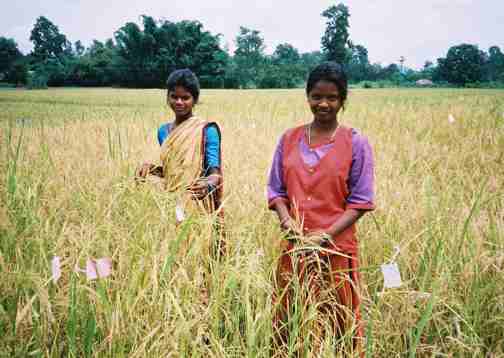PSP RESEARCH OVERVIEW - MOLECULAR MARKERS (cont.)
Marker assisted selection (MAS) to aid conventional breeding in rice
Some traits are very difficult to select using conventional field screening methods because phenotypic screens are either unreliable, difficult or expensive. Traits which are controlled by recessive genes, such as aroma in rice, are often masked in segregating populations. Selection for disease resistance is often not possible in seasons where little disease occurs and similarly drought resistance is a complex trait to select for.
 In
rice, DNA markers have been mapped to specific regions along the length of
all the chromosomes. These markers, which are linked to the genes controlling
a particular desired trait can be used to make selections from segregating
populations. Because field screening is no longer required the work can be
done in a glasshouseand generations can be advanced more rapidly.
In
rice, DNA markers have been mapped to specific regions along the length of
all the chromosomes. These markers, which are linked to the genes controlling
a particular desired trait can be used to make selections from segregating
populations. Because field screening is no longer required the work can be
done in a glasshouseand generations can be advanced more rapidly.
Once target markers have been selected in individual lines they can be crossed to 'pyramid' all the useful genes into one line. This is particularly important if the trait is controlled by several quantitative trait loci (QTLs).
PSP-funded research has produce rice bulks that are preferred by farmers and molecular markers are now being used to identify farmer-preferred regions on the genome and regions that determine adaptation to specific environments.
Visit the PSP project database and virtual library for further details of the above project.
PSP AT A GLANCE
Website Constructed and Maintained by C.M. Stirling.